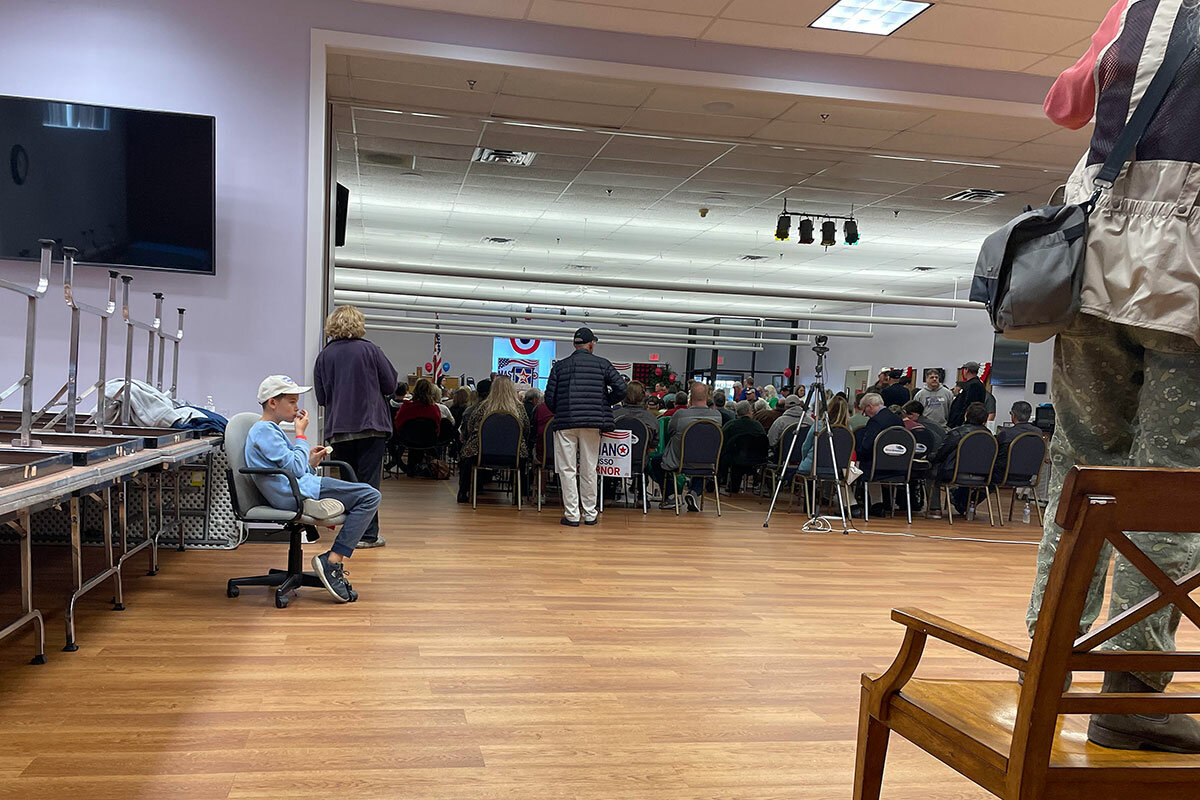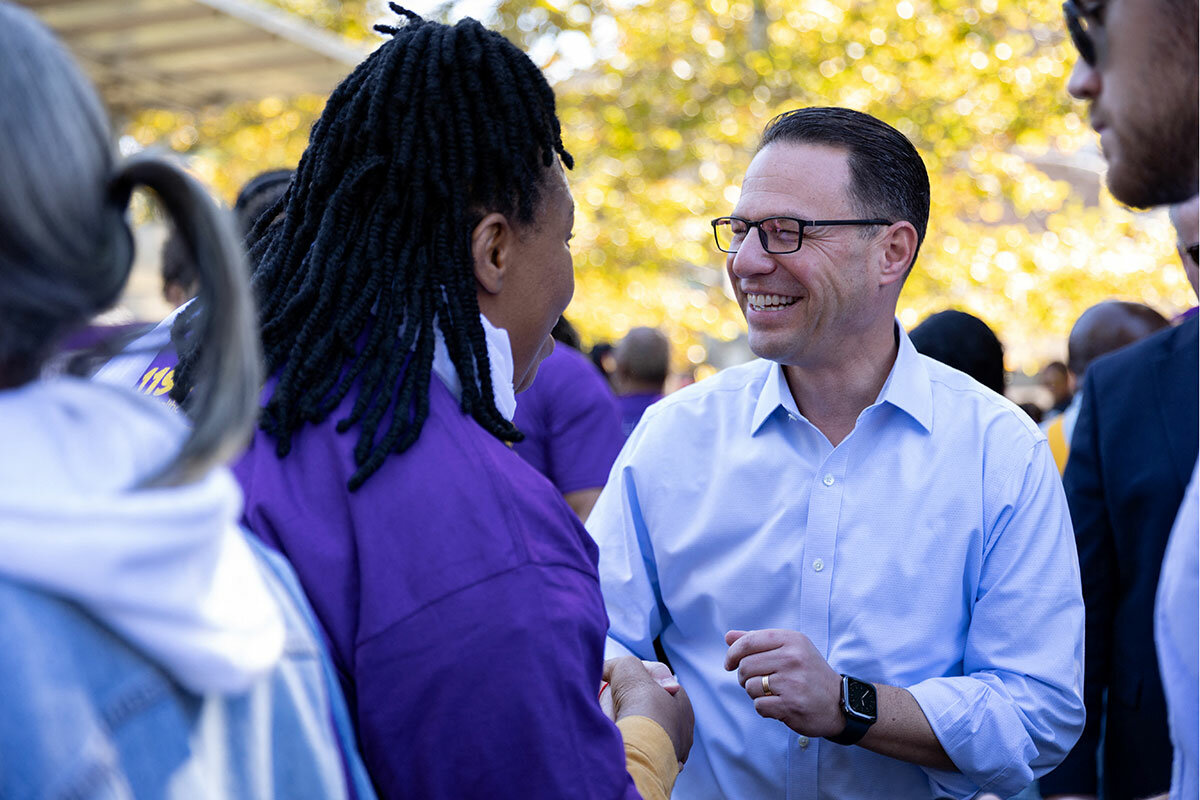From heckled to shut out: Covering campaigns is getting harder
Loading...
| Allentown, Pa.
Hopping out of a black SUV, Doug Mastriano ducks into a side entrance of the Lehigh Valley Active Life center in Allentown, where several hundred supporters have gathered for a “meet and greet.” The Pennsylvania state senator and Republican gubernatorial candidate never so much as glances at the half-dozen journalists a few yards away. It all happens so quickly, the photojournalist beside me doesn’t even have time to put her camera in focus.
For the past hour, two men in black blazers named Michael and Mark (neither would share their last names) have stood by the doors watching us as we wait in the parking lot. As soon as Mr. Mastriano is inside, Michael escorts me and the other reporters to the back of the event space, where there’s a designated press area: a small rectangle outlined in orange duct tape. He tells us we aren’t allowed to leave this area without permission. When a German reporter goes to use the restroom, Michael follows him.
At the front of the hall, Mr. Mastriano is shaking hands with supporters. We can hardly see, much less hear any of the interactions. When he finally takes the stage after about 30 minutes, a radio reporter asks if she can place her recorder up front. Absolutely not, says Michael.
Why We Wrote This
More candidates, particularly on the Republican side, deny access to reporters, while fewer voters respond to polls. That undermines our ability to understand – and accurately convey – what’s really going on.
“But you have us here, theoretically, to cover the event,” she says, trying to explain that if she can’t get good audio clips, she can’t do her job.
“I don’t know what to tell you,” Michael responds. “But I know that your phone won’t be on that podium.”
The Mastriano campaign’s well-documented – which has duly covered the candidate’s presence at the Jan. 6 Capitol riot, his efforts to overturn the 2020 election results in his state, and his – is somewhat of an outlier. But only somewhat.
Ask any political journalist today, and : The process of covering campaigns, sometimes even just tracking down the candidates, has become . The extreme partisanship gripping the nation is causing many campaigns to adopt greater security measures, as politicians face real threats. And partisan echo chambers are giving candidates on both sides of the aisle less of an incentive to cooperate with reporters aiming for balanced (read: not wholly positive) coverage. The potential for a small verbal slip to go viral on social media makes the downsides of press interviews seem to outweigh the benefits.
The challenge looms larger, however, on the Republican side. Many GOP candidates now routinely echo former President Donald Trump’s verbal attacks on reporters, with “fake news” a reliable applause line at rallies. And some are taking that scorn to new levels. In Arizona, gubernatorial candidate Kari Lake reportedly to capture her testy exchanges with journalists and repurpose the conservations for campaign materials.
Republican candidates and the media have had contentious relationships for decades. But are noting that this election cycle feels different. The lack of access in some places has left reporters struggling to see what’s happening on the ground, creating a discomfiting sense of uncertainty. Is there a big “red wave” coming on Nov. 8, in Pennsylvania or elsewhere? We don’t really know.
Can we trust the polls?
Of course, certain data points – like fundraising, party support, and polling – can provide at least a partial picture. The site FiveThirtyEight currently has Mr. Mastriano’s opponent, Democratic Attorney General Josh Shapiro, ahead by an . Mr. Shapiro has reported $44 million in spending, a state record, while Mr. Mastriano, a retired Army colonel, has spent less than $3 million. Equally telling, the Republican candidate has received no obvious support from his national party.
“Republicans pulled the plug from Mastriano’s campaign a long time ago,” says Dave Wasserman of the Cook Political Report.
Polls tell a different story in the state’s hugely consequential Senate race, where Republican candidate and celebrity doctor Mehmet Oz has been closing the gap with Democratic Lt. Gov. John Fetterman in the final weeks. Several recent surveys now have Dr. Oz within the margin of error and that Republicans are pouring in an additional $6 million to try to get their candidate across the finish line. Still, Mr. Fetterman remains the Democrats’ best chance to pick up a Senate seat in a cycle that is
But that’s all assuming the polls are accurate – and if the past few elections are any indication, they may not be. One of the biggest challenges today, , is capturing enough Trump supporters, many of whom won’t respond to the news organizations or universities that conduct most nonpartisan surveys. In 2016, polls famously underestimated Mr. Trump’s levels of support in key states, leading reporters, strategists, and much of the public to expect a Hillary Clinton victory. Then in 2020 – despite concerted efforts by pollsters to correct the problem – it essentially happened again, with many polls predicting a bigger win for Joe Biden than actually materialized.
That’s where traditional journalism can still play a key role. Political reporters can often sense momentum building by paying attention to the energy and size of crowds, talking to voters, and interacting with candidates.
News coverage of campaigns “supplements what we learn from polling,” says Berwood Yost, director for the Center of Opinion Research at Franklin and Marshall College in Lancaster, Pennsylvania. “Mastriano seems to not be holding any events for anyone except for those who are following him and doesn’t talk to the media. I don’t know if we’re missing his support because of that.”
On a recent trip to Pennsylvania, Democratic staffers for races up and down the ballot were generally responsive to queries about campaign events. Mr. Fetterman’s press team was quick to send details about a rally in Bucks County that was also listed on multiple websites. The candidate didn’t take any questions from journalists there, but at least the campaign allowed us to talk to voters. A staffer shuttled reporters to the stage while Mr. Fetterman was speaking so we could take a photo.
By contrast, none of the campaigns for Mr. Mastriano, Dr. Oz, GOP candidate Lisa Scheller in the 7th District, or GOP candidate Jim Bognet in the 8th District responded to calls, Facebook messages, or emails. I found the time and location for Mr. Mastriano’s Allentown event in a post in a Pennsylvania voter Facebook group.
Michael and Mark told me the restrictions were for Mr. Mastriano’s safety. “I don’t know you, and you don’t know me,” said Mark.
But being so tightly cordoned off meant I couldn’t report on voters’ questions to Mr. Mastriano, or what he was promising them he’d do in office. And I certainly couldn’t ask him any questions about his policy proposals, such as banning abortion with no exceptions and overhauling the state’s voter registration process.
Typically at rallies I try to gauge the enthusiasm of supporters. If multiple attendees tell me it’s their first time at a political event or supporting a certain party, that’s often suggestive of a coming surge.
Yet even when I can talk to voters these days, often they don’t want to talk to me. Particularly since Mr. Trump began encouraging his audiences to boo the reporters in attendance, journalists have faced a drumbeat of hostility from everyday Americans.
As I stood with the other reporters in the parking lot waiting to be let in to Mr. Mastriano’s event, supporters yelled “fake news!” and “lamestream media!” at us before walking inside.
A foregone conclusion – maybe
Veteran pollsters in Pennsylvania say there’s no doubt about Mr. Mastriano’s prospects – he’s going to lose.
“[Mastriano’s] support is Donald Trump’s base,” says Terry Madonna, a senior fellow at Millersville University and a longtime Pennsylvania polling expert. “But here’s the thing: In Pennsylvania, if you’re a Republican, you can’t just win with rural and small-town voters. You need to get suburban support.”
As Mr. Madonna explains, former President Trump lost Pennsylvania in 2020 despite maintaining his support among the rural, small-town voters he’d won over four years earlier, because Mr. Biden was able to in Philadelphia and the surrounding suburbs.
In order to win statewide in Pennsylvania, a state that still has more registered Democrats than Republicans, GOP candidates have to “reach beyond the [party’s] base,” agrees Mr. Yost.
To that end, Mr. Mastriano’s strategy of stiff-arming the media may be hampering his ability to reach the suburban voters he needs to win over.
“Mastriano has problems because he is going to get beat significantly among those independent voters. How do you get past your base if you’re not talking to those people?” says Mr. Yost. “If you don’t engage with the media, I’m not sure you can build the momentum.”
Still, Mr. Mastriano’s Allentown event didn’t exactly feel like a campaign that was cratering. Almost every seat in the community center’s huge rec room was filled. There was cheering, fist pumping, and a 40-minute line to take a selfie with the candidate.
After reading about on the steps of the Capitol in Harrisburg, I hadn’t expected to see so many people or so much enthusiasm. That doesn’t necessarily mean there’s a big red wave building, or one that would be sizable enough to lift a candidate who’s been labeled an extremist even by some fellow Republicans. But it’s also possible the press could be missing something.
Mr. Mastriano did not respond to repeated requests for comment.







